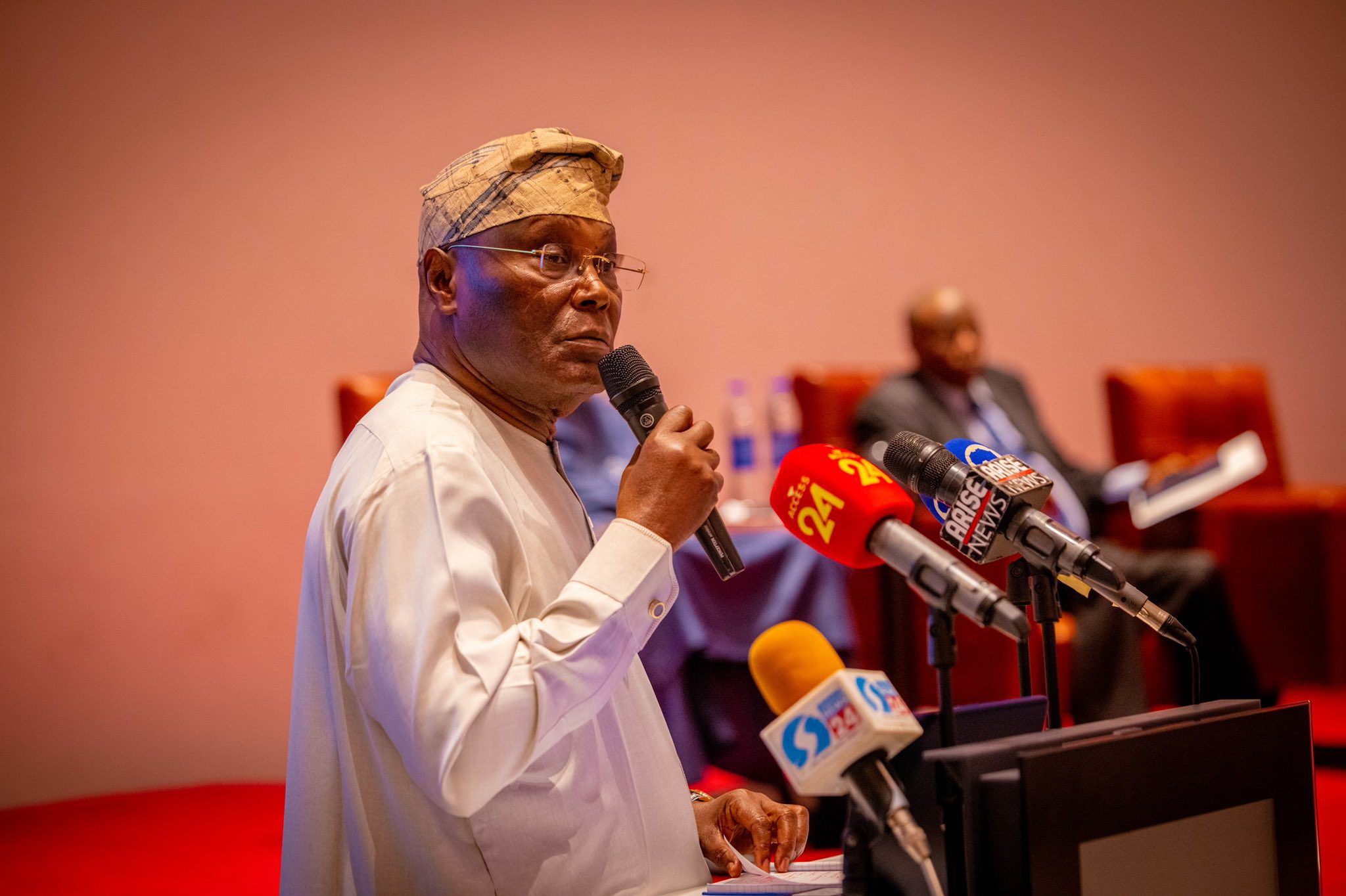Atiku has comprehensive plans for the Nigerian tech ecosystem but we shouldn’t get too excited

Since we have reviewed the policy documents of two presidential candidates: Bola Tinubu of the ruling All Progressives Congress and Labour Party’s Peter Obi, it’s only proper that we look at the last man in the three-man race for the nation’s top seat, as the general elections draw closer.
In this piece, we will look at the manifesto of the main opposition’s presidential candidate, the Peoples Democratic Party (PDP), Atiku Abubakar. The 115-page document, titled “A Covenant With Nigerians”, is said to be a spin-off of his 2019 manifesto, which we found to show little intentions for the Nigerian tech space.
(Un)surprisingly, Atiku’s 2023 manifesto is the most comprehensive policy document released by any presidential hopeful, showing a better grasp of the problems facing different sectors — including tech. That, for one, slightly affirms Atiku’s claim that he is the most experienced candidate in the race.
However, the manifesto, like Obi’s, doesn’t have a dedicated section focusing on tech. Instead, Atiku’s plans for the Nigerian tech ecosystem are stated in other sections.
Read also: Though impressive, Peter Obi’s plans for the Nigerian tech space lack depth.
A tech-driven new economy
Perhaps the biggest selling point for Atiku’s candidature is his role as the head of the “economic management team” during his stint as Nigeria’s Vice President between 1999 and 2007.
The Olusegun Obasanjo-led administration, under which Atiku served, is credited for revamping Nigeria into one of the world’s fastest-growing economies, evidenced by settling foreign debts and creating an enabling environment for the private sector.
Atiku has always taken pride in playing a critical role in this feat, but not everyone believes so.
Back to the manifesto.
One of the major highlights of Atiku’s economic agenda, as stated in his 2023 policy document, is building “a knowledge-based economy in which a highly developed ICT sector, with wide application in commerce, education, health, and other areas of human endeavour, plays a significant role”.
For Atiku, harnessing the potential of the technology-driven new economy is key, and he intends to pull this off through major plans, which will be analyzed in subsequent paragraphs.
Technology Support Program
According to the document, an Atiku presidency will establish a Technology Support Programme (TSP). To be funded by a Diaspora Bond, the TSP will “support the technology sector to meet the demand for the latest technology, especially, in software development” and, in turn create “millions of jobs for budding techies.”


If I’m not mistaken, the catch here is to grow the Nigerian tech ecosystem by creating opportunities for local talent. In truth, despite its success in attracting record funding in recent years, the Nigerian tech space battles a huge talent retention problem. For context, there were about 114,536 developers in Nigeria last year, with 200 million people and an unemployment rate of over 33%.
While Atiku’s proposed TSP is a great idea (at least on paper), the manifesto fails to show how it would be done. At least, Tinubu, who proposed one million tech jobs in the first two years of his administration, explained how he intends to make it happen.
Better IPR laws?
Protecting intellectual property rights is one of the biggest issues in the Nigerian tech ecosystem. According to PwC, Nigeria has one of the world’s weakest intellectual property laws, stressing the need for more vital legislation.
Atiku’s policy document acknowledges the need for “a more effective and efficient Intellectual Property Rights (IPR) framework”. It adds that “the current framework for tech IPR involves a multiplicity of government agencies”, which frustrates the entire process.
Hence, Atiku intends to review the current arrangement with legislation for a single IPR organization. For him, Nigeria’s Trade Marks Act of 1965 and the Patent and Designs Act of 1970 aren’t sufficient to address contemporary IPR issues. I agree.
The proposition should mean better IPR laws for the tech space, so I am optimistic about this. Recall in May 2022, the Nigerian government signed a 3-year intellectual property rights (IPR) agreement with Developing Africa Group (DAG) to create a marketplace where Nigerians can sell their intellectual property rights and receive royalties.
On blockchain
Coming on the heels of its infamous crypto ban, the Nigerian government has a complicated relationship with the blockchain space. But it has, over time, retraced its steps. For instance, in 2020, the National Information Technology Development Agency (NITDA) developed the “National Blockchain Adoption Strategy” to drive the adoption of blockchain in Nigeria. But more still needs to be done.


Atiku proposes “a comprehensive policy on blockchain technology and cryptocurrencies by the relevant government agencies”. The mandate here is to ensure that these areas are well-regulated to create job opportunities for Nigerians.
This could result in multiple laws, considering Nigeria already has a blockchain technology strategy document. Why create another policy when you can review the existing one? Don’t forget that the fear of over-regulation is one of the reasons why players in the blockchain space don’t trust the authorities in the first place.
Related article: Tinubu’s manifesto shows little understanding of the Nigerian tech ecosystem.
ICT literacy and STEM
It’s no longer news that ICT is important for Nigeria’s economic growth, and any serious government must be interested in driving up digital literacy. The government of the day hopes to achieve 95% digital literacy among Nigerians by 2030
According to Atiku’s manifesto, the plan is to “encourage tertiary institutions, research institutes, Innovative Enterprise Institutes (IEIs) and relevant government agencies including The National Information Technology Development Agency (NITDA), National Office for Technology Acquisition and Promotion (NOTAP) and National Agency for Science and Engineering Infrastructure (NASENI) to develop research capabilities and be actively involved in the teaching and training of our youth in the field of renewable energy, especially solar and wind; artificial intelligence (AI); and nanotechnology.”
This is an attractive proposition, though unclear in terms of implementation and how it would play out. This plan also would be dependent on several other factors.


Similarly, under the education segment of the manifesto, Atiku wants to develop and promote Science and Technical Education to create skills for the new economy. For one, there has been an unending cry for the fusion of STEM subjects in the Nigerian education system.
To make this happen, an Atiku presidency says it “will collaborate with the States to prioritize science and technical education including ICT and related IT-based programmes”. In the same vein, the Technical and Vocational Education and Training (TVET) will “receive priority attention in policy and funding” just as “the TVET systems shall be improved and capacitated to deliver quality and relevant training and assessment aligned to the Nigeria Skills Qualification Framework (NSQF)”.
The government will also oversee policies on strategy, management and delivery of science and technical education at technical colleges, polytechnics, and universities. Finally, it proposes incentivising the organised private sector “to increase its level of investments in science and technical education“. This would be in the form of tax breaks, grants, and loans.
On technology infrastructure
One of the pillars of Atiku’s economic agenda is a central objective to “place Nigeria in a leading position to take advantage of global strides in innovation and technological advancements”.
To achieve the above, the Atiku-led government proposes five actionable plans. The first is implementing a four-year plan to digitise major government operations such as procurement to achieve transparency and eliminate leakages.
Secondly, the use of business intelligence software to analyse public service productivity would be strengthened. Thirdly, his government will support the private sector to improve the technology start-up ecosystem by providing incubation, financing, and infrastructure.
Number four is to review, with timelines, partnership agreements with experienced incubators and accelerators to improve the penetration of technological advancements in the country. Finally, it will enforce and protect intellectual property rights.
These are great plans, but the Nigeria Startup Act already offered some of these provisions. Perhaps we should expect a review of the law if Atiku becomes president.
In sum
Atiku’s comprehensive manifesto offers more confidence, and it is by far the best policy document we’ve reviewed. It, however, failed to mention some important areas of the tech ecosystem, such as broadband infrastructure, venture funding for startups and a better regulatory environment for startups in terms of policies and regulatory frameworks.
Still, one has to acknowledge the exciting plans that the manifesto brings to the table.



